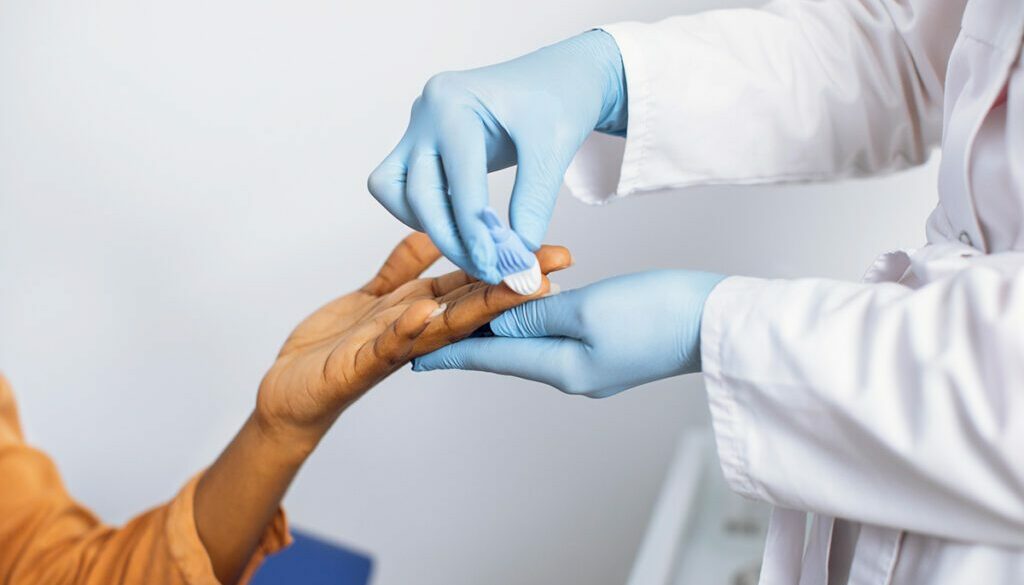Diabetes Tests & Diagnosis
Diabetes is a complex metabolic disorder that affects millions of people worldwide. Early detection and proper management of diabetes are crucial to prevent serious complications. CMC Endocrinology explains the difference and significance of the various diabetes tests doctors use and the role of endocrinology in diagnosing and treating this condition.
Diabetes, prediabetes, and gestational diabetes can be diagnosed using blood tests. The blood tests show if your blood glucose level, also called blood sugar, is higher than the range that is healthy for you. Blood tests can also help identify the type of diabetes you have.
According to the National Institute of Diabetes and Digestive and Kidney Diseases , you should never try to diagnose yourself if you think you might have diabetes. Over the counter blood testing equipment, such as a blood glucose meter, cannot diagnose diabetes.
Understanding Diabetes Tests
Fasting Plasma Glucose Test
The fasting plasma glucose test is one of the most common diagnostic tests used to identify diabetes. It involves measuring blood glucose levels after an overnight fast. Fasting means having nothing to eat or drink except sips of water. If the result shows a blood glucose level of 126 mg/dL or higher on two separate occasions, it indicates diabetes.
Oral Glucose Tolerance Test (OGTT)
Before the test, you will need to fast for at least 8 hours. The OGTT is performed by measuring blood glucose levels before and two hours after consuming a glucose-rich drink. This test is commonly used to diagnose gestational diabetes and evaluate impaired glucose tolerance. A blood glucose level of 200 mg/dL or higher after two hours confirms the diagnosis of diabetes.
If you are pregnant, your blood will be drawn every hour for 2 to 3 hours. If your blood glucose levels are high two or more times during the OGTT, you may have gestational diabetes.
Hemoglobin A1c Test (HbA1c)
The HbA1c test provides an estimate of average blood glucose levels over the past three months. This test is convenient as it does not require fasting. A result of 6.5% or higher is an indicator of diabetes. The higher the percentage is, the higher your average blood glucose levels are.
Random Plasma Glucose Test
The random plasma glucose test measures blood glucose levels at any time of the day, regardless of the last meal. If the result shows a blood glucose level of 200 mg/dL or higher, it suggests diabetes.
Glucose challenge test
If you are pregnant, your doctor might test you for gestational diabetes with the glucose challenge test. A sample of your blood is taken 1 hour after you drink a sweet liquid containing glucose. You do not need to fast for this test. If your blood glucose level is too high—135 mg/dL to 140 mg/dL or higher—you may need to return for an oral glucose tolerance test while fasting.
The Role of Endocrinology in Diabetes Care
Endocrinology is the branch of medicine that deals with hormone-related disorders, including diabetes. Endocrinologists at CMC Endocrinology specialize in diagnosing and managing diabetes, ensuring you receive optimal care.
- Diabetes Diagnosis and Treatment Our endocrinologists play a crucial role in diagnosing diabetes. They interpret test results, assess symptoms, and determine the most appropriate treatment plan. Depending on the type of diabetes, treatment options may include lifestyle modifications, oral medications, insulin therapy, or a combination of these.
- Management of Diabetes Complications Diabetes can lead to various complications, such as cardiovascular disease, kidney problems, and nerve damage. Our endocrinologists closely monitor these complications and provide targeted interventions to prevent or manage them effectively. Regular check-ups and adjustments to treatment plans are essential to optimize patient outcomes.
- Patient Education and Support Our endocrinology team also educates patients on diabetes self-management, including blood glucose monitoring, medication administration, and lifestyle modifications. They offer guidance and support to help patients achieve optimal control of their blood glucose levels and maintain a healthy lifestyle.
Regular diabetes tests are vital for early detection and effective management of this silent killer. Consulting an endocrinologist at CMC Endocrinology ensures accurate diagnosis and comprehensive care. By working together with our experienced endocrinologists, we can help you lead a fulfilling life while minimizing the risk of complications from diabetes.
Remember, staying proactive, informed, and seeking professional guidance are key to successfully managing diabetes and achieving your long-term health goals. At CMC Endocrinology, we are excited to offer top-notch treatments and service you can depend on. Call 843-234-9700 for more information about our practice and the physician referral process.




